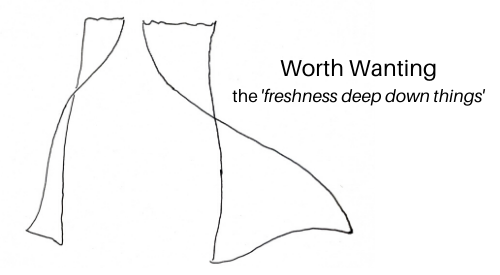
When is work, not work?
Consider the second chapter of the book of Genesis. There’s the work of making the cosmos and an assortment of living things mentioned early on in the chapter, and then there’s the work of hoeing and mowing the garden, mentioned a few verses later. Work is work, right? Every translation I’ve read uses the same word for both activities.
And that word, work, refers to something we have to do, like it or not; something that uses us up; something we have to be paid or enslaved to do. And the verses have been used to justify toilsome labor. If you want rest, you have to first work. It’s in the book.
But actually, according to the book, cosmos creation is one kind of ‘work’ and lawn and garden maintenance is another.
The second kind of work is referred to by the word ‘avoda’ and it means toilsome labor. That’s the common understanding of the word, so it’s no surprise that many apply that same sense to the first ‘work’, cosmos creation. However, a different word is used to refer to that kind of exertion: ‘melacha’.
I’m no scholar but here’s what I’ve gleaned from my unsupervised research: the word translated as ‘work’ in the first part of the chapter is actually more like intelligent, artistic creativity, the devoted exertion of an craftsman, the making concrete of what was only concept. Some commentators see the core notion of the word in the idea of transformation, the carrying through of an idea.
Perhaps instead of as ‘work’, we translate the word as ‘play,’ because of the implicit connotations of freedom and joy in the word ‘melacha’. So, ‘on the seventh day, God rested from his play.’
God, dwelling by all accounts in the transcendent, and playfully creating the mundane world? Even I find this rendering jarring. The simple fact of death and suffering throws considerable shade over any notions of careless light-heartedness as the attitude behind the creation of this cosmos we inhabit, this life we live.
And yet play can be grave as well as frivolous, sustained as well as impulsive, responsible as well as carefree, and it’s not just recuperative, getting us ready for the next stint of work. Surely nothing in the Genesis account suggests that creation is anything but a spontaneous and unaccountable expression of exuberant abundance, which is the essence of play.
I suggest here in Worth Wanting that encounters are both the workshop and the playground of freshness; that encounters are the points of contact, the portals, between the mundane and the transcendent; and that beyond and before the world of work, there is a world of play, not a respite from reality but real itself.

This is thoughtful. I wonder if work becomes sweaty-toilsome when we are in the independent, survival drivenness mode rather than seeing work as creative stewardship in co-laboration with the inner Creator?
James Carse in Finite and Infinite Games speaks about poeisis or the making vs poeima the made, and following that distinction, perhaps malacha is pure poeisis, and avoda is about fungible products in the marketplace of urgencies. Inner Creator: what do you mean by that phrase? Thanks for your response.